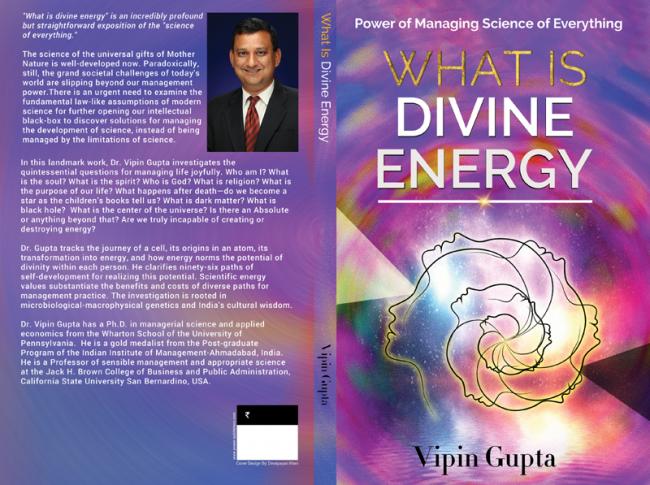NITN | @notintownlive | 29 Dec 2020, 01:47 am

Science of Everything
The author delves into quintessential questions about how to manage life joyfully and the science of everything in his book
Congratulations on the release of ‘What is Divine Energy’. You are not a full-time writer but a professor by profession. How and when do you manage time to write in between your regular busy career?
As a Professor, I have always enjoyed writing as a way to introspect and clarify my consciousness on things I am reading, observing, experiencing, and teaching about. I do not keep my mind loaded with thoughts and things. Writing helps keep my mind fresh and gives meaning to my life.
Since my Ph.D., from the Wharton School in 1998, I have published about one-hundred and eighty articles and chapters in refereed journals and books. Besides I have authored and edited seventeen books.
One of the things I have researched extensively is how women manage so many things in their life—children, significant others, parents, in-laws, extended family members, friends, work, home, community members, birds and animals, nature and environment, culture and religion, and their health and aspirations.
I have had an opportunity to work with and interview several highly accomplished women leaders.
I learnt that by rising above the artificial boundaries among different elements of one’s life and taking a holistic approach, one can seamlessly do multiple things in ways that are meaningful both to oneself as well as everybody else.
My mom was also a working woman and for most of the time growing up, she was the primary breadwinner at our home, since my father has been engaged in the field of divinity since the early 1980s.
I have seen her rise up early and do many things, without any rest or without wasting a single moment, just through her simplicity and devotion to her family and everybody around her.
Tell us something about your book. What is the subject of this book?
The subject of this work is the science of everything.
It helps the audience with the answers to questions such as: Who am I? What is the soul? What is the spirit? Who is God? What is religion? What is the purpose of our life? What happens after death—do we become a star as the children's books tell us? What is dark matter? What is black hole? What is the center of the universe? Is there an Absolute or anything beyond that? Are we truly incapable of creating or destroying energy?
The foundation of biological life is a cell. The foundation of physical life is an atom. The foundation of all things that exist is a unit of energy.
The foundation of all things that do not exist is the potential of divinity within each person. The foundation for potentiating divinity is the work. The foundation for doing work is our breathing value. It implies that the energy value of a cell is the same as that of an atom, unit of energy, a unit of divinity potential, a unit of work, and a unit of breathing value.
What is that energy value? Can energy take varying forms, with varying unit values? If yes, then where does that leave us with Einstein’s famous energy equation? Or for that matter, the law of energy conservation. How can we potentiate our divinity potential for leaving an effect for eternity?
Should we believe the scientists who say that since energy can’t be created, we cannot leave any effect of our presence on earth for posterity, unless that effect is an illusion of our belief, perception, and conception?
What if we test the sacrosanct theories and laws of science by postulating a hypothesis that everything that scientists say or claim has zero energy value, since no scientist can ever create anything that has energy?
In that case, it is self-luminous that one will only waste energy by reading the scientific theories and ideas that are attributed to specific individual scientists and are translated into patented technologies.
A prudent approach is to reflect on what can we learn from Mother Nature directly with the blessings of those who do have the power to create energy that Mother Nature then selflessly gifts to us?
What new ideas have you contributed to the subject; or how is this book different from other books on a similar subject?
Everything that has been written or spoken by anybody, as a work of science, religion, or management, is an alternative to this book.
The book supplements what has been said over the course of the entire history of human civilization. It takes everything else as a negative one, as the metric of present reality that is the cause motivating further research.
It then seeks to clarify the nature of present reality, worth one unit. It demonstrates that the energy of one whole unit is not the same as the unit value of energy, as the exchange value of the atom or the cell.
The unit value of energy includes the one unit constituting the nature of present reality, followed by nine units constituting the thing that reflects and projects that nature through its presence. It makes the sacred and secret knowledge hidden within the Vedas, Puranas, Upnishadas, Mahabharata, Ramayana, and Bhagwat Gita evident using the scientific parlance and their Hindi/ Sanskrit equivalents.
Who are your target readers; in other words who do you expect to read this book?
This book has been inspired by India’s cultural wisdom, which holds that everything we do, read, observe, and experience must be oriented toward our self-development.
Our self-development is the best path for universal development. Only when we have developed the self, we are in a position to service our mastery of the method for self-development with everybody else.
Our self-development dissolves all confusion and doubts in the mind of everybody else, and lets each of them enjoy the same benefits, without the costs of our intermediation for the sake of our name and fame.
One guided by name and fame is never able to discern the reality and selflessly present the reality, without involving one’s ego or emotion, to everybody.
Further, the test of the authenticity of one’s self-development experiences is whether the findings resonate with one’s intrinsic consciousness. An authentic experience does not need social justification for believing.
Each person who is ready to move forward in life by taking their mood, destiny, divinity, and eternity in their hands will find this work valuable and practical.
Everybody else who believes that there is some invisible force that is and will be taking their life forward, as long as they believe faithfully in what the scientists are telling them, even when the scientists are busy in falsifying the work of those preceding them, is bound to become invisible from the face of this earth and will not benefit from investing their energy into reading this work.
‘What is Divine Energy’ raises questions about God and religion. As a scientist do you believe in God and religion? What are your views about God and religion?
First of all, the reality of divine energy is not contingent on our beliefs or the belief system. That reality was the same one million years ago and will be the same one million years from now.
Many have written or spoken about divine energy. However, none of those writings were based on the direct experience of authors with divine energy.
I am a management scientist.
From a management perspective, the divine energy is the power to consciously decide what we wish to manifest and excellence in manifesting that. It is the energy whose potential is within each of us.
When we do not believe in this fact, then we let others take advantage of our divine potential.
After losing what we intuitively know was the fruit of our labor (karma marga—the path of action), we develop a satanic orientation seeking to be even by shortchanging others.
A few of us realize the folly of polluting our consciousness with the ways of the world and seek to gravitate our energy toward knowing the nature of present reality (jnana marga—the path of knowing).
We then become busy in sharing what we believe is the truth discovered by us with everybody else.
When others share their discoveries with us, we become angry that why others are not conserving their energy and just following us.
Then, we become depressed that we were not able to discover what others are discovering. We then attribute the variations in the discovery power of people to an invisible force, that we name as God. We give different names to God.
If we believe there is no God, but only a creator factor who is the source of everything, we name that Bhagwan (supreme deity). If we believe there is only one God, like in the West, we name that one Ishwar (para deity). If we believe there is somebody beyond God, we name that Maheshwar or Khuda (primeval deity). If we believe that somebody beyond God and extrinsic to us is a form of someone intrinsic to us, we name the one within us the Parameshwar or Shiva (param deity).
We thus eventually become devoted to one within us (bhakti marga—the path of devotion).
However, the one within us is not us. We are all a self-luminous entity, conscious of the luminous element within us, which is motivating us to find a path for self-realization (siddhi marga—the path of realization). The paths of action, knowing, and devotion are all sequential paths to self-realization.
However, we are not the self who is investigating these varying paths over time, as a function of our past experiences and the present consciousness. The self implies there is a universe without the self. Both the self and the universe are the forms of the luminous element. When we realize our potential to be the universe, made out of the animate cells and its inanimate atomic form, then we develop awareness of the oneness of the self and the luminous element within the self-luminous element, which is illuminating our self’s potential to us.
In that moment, we realize that what we believed to be within us is us. We are all the param deity, whose divinity has been lost over time, seeking to compensate the escalating costs being experienced by Mother Nature, as a primordial deity, from the evolutionary paradigm that makes each of us a Satan for an extended period, before we find a guru to guide us to get on to the path of knowing, for eventually ascending to the path of devotion, and eventually the path of realization to be the one who has realized the absolute and has become a “siddha”—the param deity, who is a sentient entity living the life joyfully without any violence, i.e., impact, positive or negative, on anybody or anything.
When one masters the science of being siddha—the sentient entity, then one realizes that religion is a dynamic correlation among the creature, the creation, and the creator.
This correlation varies every time moment and space coordinate. Therefore, the religion and its understanding for one person is always different from that of the other person.
Even our understanding of religion varies over time, as we trade the extrinsic space and time varying energy from our ecosystem. One must rise above the limitations of the religion for developing a clarified consciousness of our divinity and our potential to shape eternity.
What kind of books inspire you as a writer? What are your favourite subjects? Who are your favorite authors and poets?
The books are not an inspiration for me. The entities around me are my inspiration.
I am inspired by each person who transcends the conceived limitations for making fruitful contributions to one’s self-development and opens the path to development par excellence for everybody else. I am inspired by those who are sincere, disciplined, dedicated, and devoted to whatever they are doing.
The books are just a medium for me to know the works, experiences, and interpretations of those who took precious time in their life to share their insights for the benefit of the larger community and the future generations.
I am blessed that today we live in a digital age where all the rare manuscripts from different cultures and times are available online, with their English translations. It has made it very easy for me to make everyone my guru for developing myself one step at a time.
By introspecting on each word and work I find in front of me, I develop a clarified consciousness of the linkages among different things.
When I am writing, Mother Maha Saraswati is the author and Grandfather Shri Krishna is the poet. I transform myself into the subject who is enjoying the present reality of everything being illuminated in front of my eyes in the form of the text.
I do not have to think about anything that I write. Something that is contaminated with a thought is not the present reality of divine energy. It is the past reality of the entity which is servicing the motivation for the thought. One can’t be the entity servicing the motivation for the thought, without suspending devoting energy to the formation, the organization, and the transformation of a thought.
Who or what inspired you to nurture the writer in you?
My guru is Shri Kartar Singh Yadav ji. He was my father’s professor at the Indian Institute of Technology-Kharagpur, Vice chancellor of the Hissar University, ex-joint commissioner of the Ministry of Agriculture India, and the resident director of the national federation of all the state agri-industrial organizations.
He now lives as the Primordial Greeter, after having left his physical body. He is the one who opened the portal for my oneness with both Maha Saraswati, the primordial perpetuator, and Shri Krishna, the primordial illuminator.
I am just the medium for perpetuating and illuminating the secret wisdom of ancient India, which was within the awareness of the Siddhas, but was never articulated, because it was not an appropriate time for the mass illumination of this wisdom.
We are at a juncture when the Kali Yuga will be ending and the Sat Yuga will begin on July 1, 2032.
The period until then will manifest what is known as “pralaya”—the flooding of alien entities, like the COVID-19 virus, leading each one of us to shift our priorities from the extroverted materialization of what becomes a cause of mass suffering to the introverted manifestation of what is the cause of our joy as a person.
It is the time for the revelation of this sacred wisdom, hidden so-far within Shiva, the param deity.
We hear that you plan to write 12 books in 12 months. Is it true? What will the topics be like?
I plan to publish 12 books in the year 2021, starting with the first book on January 16, the birth anniversary of my guruji. I have been working on these books since the summer of 2017.
They illuminate the secret of the science of everything, covering all major issues in science and mathematics, the super-science of what is beyond the present reality, the comparative study of all major religions, the archeological, historical, and cultural study of all major civilizations, and the critical study of all the major theories and the ideas in management, organization, and allied disciplines, including economics, humanities, and social sciences.
The work will culminate with the quantification of the technological growth in different nations and the worker and the social benefits and costs of that growth, to illuminate the path for ascending universal consciousness over the future generations.
The body of work provides an integration of the astrological, spiritual, and the diverse academic sciences from a management perspective. Each book services a holistic unit of energy and can be read, without reading any other work. Each chapter and each section of the work is standalone. The entire work as a whole offers an ascending mental clarity and one who is dedicated to the work will enjoy the self-luminosity as the fruit of their labor.
Tell us something about yourself and your professional background.
I have always been interested in reality beyond what is obvious. I joined academics so that I can master the technique of how to challenge what is obvious.
I realized that while academics claim to value originality, in reality, they reject all original perspectives and evidence, if they are not grounded in the past theories and ideas.
I read a research that showed that few Nobel Laureates have published their most influential articles in the peer-reviewed academic journals.
I was the co-editor and co-author of the award-winning GLOBE book “Culture, leadership, and organizations: The GLOBE Study of 62 Societies” (Sage Publications: 2004), which is now a part of all major international business and organizational behavior textbooks.
When we were trying to publish the early findings that contradicted the established value-belief theory, all top academic journals rejected the work.
The reviewers and the editors always wanted more details and evidence than what could fit in a short paper.
However, after six years, when the work was published as the book, which is now a landmark, the papers that cited the book got published without a critical view from any reviewer, even when none of the reviewers had read the book.
As long as we cited somebody (even when that somebody is we ourselves) has published the work on which the work under review is based, our work got accepted and gained instant credibility.
It was the limit of blindness of the reviewers who were blind to the fact that the work they are reviewing and now endorsing is of the same authors who worked on the book.
Since then, I have always found the process of academic publishing absolutely broken.
When I know that the paper I am writing is for the children, it gets immediately accepted. Whenever the evidence or the concepts are a little deep, it goes above the head of the reviewers. Then, the reviewers and the editors make it appear that the problem was in the paper, rather than their willingness to devote the time necessary to do the justice for understanding the thesis and its substantiation.
When I decide to publish the same paper in emerging journals, then it becomes the basis for the academics to comment that they will never ever publish in the emerging journals and do not value those who do.
I find it funny that on the one hand, the academics do not have the time to carefully read something new and to give credit for the originality and meaningfulness of the work. On the other hand, they devote huge amounts of time to reviewing something and giving detailed feedback on something that only quotes the work of others, that everybody was supposed to know in the first place.
The academic journals have become proficient in publishing not the original perspectives, but the illusion of the original perspectives that just paraphrase what is already known to everybody in the discipline.
If there is so much need to build on what already exists, then why keep on repeating what already exists every time you are writing about something new?
Why can’t journals just ask each author a list of ten things that already exist that one should read, before they read what new thing is being illuminated in an academic work?
Why is there a need for somebody to cite others, if the only ideas worth publishing are the original ideas?
Why is there a need to invite people to contribute their ideas, if what we are interested in knowing is the present reality?
There can’t be two different views on the present reality. People may have different ways of expressing and explaining the present reality. However, giving credit to somebody for a more interesting way to explain something that resonates with a larger group of people is different from giving credit to somebody for an original contribution, when that contribution comes to nothing, if not for the work one is citing and using as a foundation for further contributions.
The reason why we find it very difficult to go past the opinions and the numbers is the need for making our thesis whole.
In reality, it is not possible to make any thesis whole without integrating the concepts of science, management, and divinity. The science is about what is visible as light, as an account of the past management behavior. The management is about our strategic awareness of our divinity for managing our life the way we wish to manifest what we wish.
Science studies what managers do and make and identifies the most cost-effective ways the things have been done or made, so that one may perpetuate that for mitigating the management costs. Science without knowing the management dimension makes one attribute the variations and the deviations observed to a transcendental force.
The scientists then identify that transcendental factor as either random chance or invisible force or object that they have not yet been able to observe and measure.
Eventually, after asking a series of questions about the origin of the chance and the invisible elements, they theorize that nothingness is the origin of everything-ness. They then hold that something secret and beyond science must catalyze the transformation of invisible nothing into the visible everything that constitutes the present reality.
What is beyond science is a self-luminous entity, an entity that is not a thing, but has the power to illuminate the thing by itself, without anything within nothing.
My primary inspiration to write this book is to discover the secret of the self-luminous entity within me, the one that has made me who I am at present. It is the path for me to cultivate and develop my essential nature, without the polluted becoming, guided by everything that has been catalyzed by the self-luminous entity.
It is the way for me to share this path with everybody who is interested in their self-development, transcending the limits of science.
- Kolkata CP urges elderly to stay alert against digital scams at ‘Pronam’ interaction
- Sona Incubations, Salem picks 17 startups for Rs 11 Mn DST investment, grant
- Visva-Bharati University unveils a transformational roadmap under Vice-Chancellor Dr. Probir Kumar Ghosh
- Sona College of Technology hosts Think Salem 2025: To spur startup opportunity from Tier-2 Cities
- ACM India unveils National AI Olympiad 2026 to spot school talent for global AI stage
- Reject Macaulayan education, reclaim Indian values: H M Bangur’s big World Hindu Economic Forum pitch
- Sona College of Technology: Many academic, research and industry-linked advances in 2025
- Kolkata: ICCR hosts 10th anniversary celebration of Robir Kiran
- Sydney's Bondi Beach horror: Pakistani-origin man named as one of the key suspects
- ‘Abba Aur Main: Ek Anokhi Dastan’ — Urdu Translation of Neelima Dalmia’s Memoir Launched at New Delhi’s Jashn-e-Rekhta Festival
Etihad Airways is set to introduce direct flights to Luxembourg, becoming the first airline from the Middle East to operate services to the country. Launching on Oct 29 2026, the new route will also be the only nonstop connection between Luxembourg and Abu Dhabi, linking two key centres in Europe and the Middle East, the airline said.
Lufthansa will mark its 100th anniversary in 2026, commemorating a century since the founding of the original “Luft Hansa” on January 6, 1926. The airline’s first flight followed shortly after, on April 6 of the same year, marking the beginning of what would become one of aviation’s most recognisable brands.
Tata Group-owned Air India on Tuesday announced a new, unilateral codeshare partnership with airBaltic, the flag carrier of Latvia, thus making the Baltic region more conveniently accessible for Air India customers.





